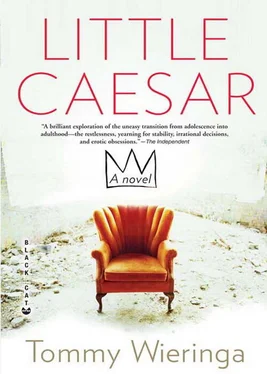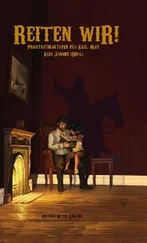Tommy Wieringa
Little Caesar
‘And who,’ I said, ‘was his father, and who his mother?’
— Plato, Symposium
At Norwich Airport I rented a Ford Focus, the only automatic they had.
‘Have you ever hired a car with us before, Mr. Unger?’
She had the watery beauty of many women in these parts, the same lank blonde hair. I wasn’t to be found in the system; she copied my passport and license and slid them back to me across the counter.
‘And the key of course. Won’t get far without that.’
She reminded me of the girl I’d seen once by Bunyan’s Walk, after I’d heard something and left the path — on the mulchy forest floor I saw her, she was riding a motionless old man. He had his pants down around his knees and was looking up at her in glassy fear, at her big white breasts bouncing up and down, her glowing red face. The ferns had rolled their tongues out.
I took the key from her. Gleaming ivory were her nails.
I had left Holland because of the message delivered to me that morning.
‘A telegram,’ the receptionist at the Pulitzer Hotel said. ‘For you.’
Warren passed away.
Funeral Monday 2 March.
Catherine
As I was packing my bags later on, I thought about how Catherine must have invoked God and all his angels in her efforts to convince the postal worker to actually send a telegram. In her world, the announcement of the death of a loved one did not take place over the phone. Warren himself would have disapproved of that as well, amiably but firmly. Back when we were still neighbors, when I would call them because I was too lazy to walk the short distance to their house, they always answered only after many rings and in a sort of quandary, as though they thought: what is that strange thing ring-ringing in the hall?
The bronze urn with my mother’s ashes, which I’ve been carrying around for a few months, I put in a plastic bag. I wrapped two sweaters around it before stuffing it in the suitcase.
The Ford smelled of new. DRIVE LEFT, the sticker on the dashboard warned. I left Norwich and drove to Suffolk. The cozy feeling of hollowed roadways, the tall hedgerows on either side. I missed the turnoff; Alburgh was badly marked. Little in the way of street lamps in this corner of the world. Just before reaching the built-up area of Alburgh, I turned. Back on Flint Road, a rubbly road full of potholes. In the cold light of the headlamps I saw slow, sick rabbits. Fountains of muddy water sprayed from beneath my tires. This road served to link together those few houses still remaining on Kings Ness. Kings Ness! Glorious heights on which we’d made our stand to the bitter end!
A dull smack in the rear wheel well. Coup de grâce for a myxomatose rabbit.
I stopped before number 17. The porch door stuck; I took off my shoes and put them in the darkened vestibule. Then I knocked softly and opened the door. A flood of light, women at a kitchen table. Catherine was sitting at the head; the others were her Irish daughters by her first marriage. All four of them.
‘Boy,’ she said. ‘There you are, finally.’
She rose to her feet like a nail being levered straight, and wrapped her arms around me as if I were a lost son. My nose in her fragrant crown, I stood there, stared at by her hulking daughters.
‘Catherine. .’
‘It’s all right, boy, it’s all right.’
I shuffled in stocking feet across the linoleum, around the circle of daughters, shaking hands, expressing my condolences on the loss of their stepfather. Someone handed me a glass of whisky.
‘Glenfiddich,’ one of them said, ‘the only thing I could get at the duty-free.’
They watched as I drank. I had always kept my distance from them, in the old days, when they would come over from Ireland to visit. They would hurt me when no-one was looking, pinch me or pin me to the ground and tickle me till I started crying. I may have been only the boy next door, but the fact that Catherine seemed to draw no distinction between me and her own children made them jealous and unpredictable. They lived with their claws extended.
Occasionally one of them would bow her head and blow her sorrow into a tissue. Through the window I could see the little lights of Alburgh. Catherine smiled at me.
‘Warren asked for you at the end. He wondered whether you were going to come. It was hard to reach you, boy. Promise me you’ll never disappear like that again.’
I was touched to know that he had thought of me on his deathbed.
It was the kind of thing one had to deserve. I wasn’t sure I did.
‘Your mother,’ Catherine said. ‘It must have been terrible for you. I got your card.’
‘I had to let you know,’ I stated.
‘How long ago was it?’
‘May. Almost a year already.’
‘So young,’ she said. ‘Far too young.’
The daughters stared. I wondered whether they had already reproduced, helped to swell the ranks of blunt objects in the world. Two of them had their heads together, mumbling in that guttural Gaelic of theirs. Another one filled the glasses.
‘This is a heathen land,’ Catherine said. ‘They wanted to keep Warren at the funeral home. We were only allowed to see him by appointment. Then they arranged him for us. But we keep our loved ones with us, at home, till the very last day. And then we play music and drink.’
A flurry of disgust crossed her face.
‘So cold, the English, so cold.’
‘Heathens,’ a daughter said.
Catherine produced a hypodermic and a vial from a drawer in the table and prepared a shot of insulin. One of her daughters stood up. Catherine lifted her sweater a bit and pointed to where the shot should go.
‘All those years Warren kept track of my blood sugar levels in a notebook. You could see every little fluctuation. Now I have to learn how to do everything. Like a child.’
‘You’ll learn,’ one of her daughters said. ‘We’ll help you.’
‘Do you want to see Warren?’ Catherine asked me.
I shook my head.
‘Tomorrow morning,’ I said. ‘When I’ve prepared myself for it.’ The dry rasp of the metal cap screwed off the bottle. The single malt seared my gullet, and from my numb mouth there now tumbled questions about the cliff, its inhabitants, the damage caused by winter storms. The erosion that never stopped.
At the end of the Alburgh pier, where the Belle Steamers full of London holidaymakers once tied up, two fishermen were leaning over the balustrade. They each had two lines in the water. Below them the leaden gray waves washed around the pilings; the sea was cold as a corpse.
From here you could clearly see Warren Feldman’s titanic accomplishment, and how those efforts had already been almost obliterated by the sea. Over a length of about one kilometer he’d thrown up a wall of turf, earth and clay — the wall was four meters high and stood out darkly against the yellow sand of the much higher cliff against which it leaned at Kings Ness. A primitive bulwark against erosion. Since time began the land here had been eaten away by the sea, during storms, when the North Sea threw its clenched fury at the cliffs of eastern England. Far away, at the extreme northern end of Kings Ness, stood the home of John and Emma Ambrose. All the house needed was a wee push to be drawn into the abyss.
My mother and I had known the falling feeling that went with living on the edge. The inhabitants of the medieval town of Castrum had known it too, the water had driven them further west all the time. Now the sea flows where the city once lay, Castrum no longer exists, her name sounds like Atlantis. She was lost to the North Sea, which gobbled her up storm after storm, bite by bite. The western edge of the vanished town had snuggled all the way to Kings Ness. You could say that we, the people of Kings Ness, are the final inhabitants of Castrum, the last of the Atlanteans. Our house too, on that night long ago, became a part of the ruinous street plan of Castrum which stretches some three miles eastward out onto the seabed, and is visited only by divers and sea creatures.
Читать дальше












